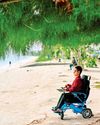
IN MARCH 2015, a source in Turkey informed Indian agencies that Dr Shahnawaz Alam, an Indian Mujahideen operative, was declared dead in Syria. The source had photos of Alam in Turkey before he crossed over. A special cell of the Delhi Police was keeping a close watch and a team was ready to travel in plain clothes just to confirm the news, but the plan was dropped. India did not want to risk diplomatic embarrassment, given the growing uncertainty in the region.
Soon after, there was information that Alam's accomplices, Bada Sajid and Abu Rashid, were also killed. All three men from Azamgarh in Uttar Pradesh had fled India after the Batla House encounter in Delhi in 2008. They reached the Islamic State-held territory in late 2013 or early 2014 after spending time in Pakistan and Afghanistan, said senior police officers. Some others, such as Anwar Hussain and Shafi Armar from Bhatkal in Karnataka, were also reported dead.
The Azamgarh module, along with some like-minded operatives, was believed to have formed a splinter group of the Indian Mujahideen, called Ansar ut Tawhid, to fight alongside the Taliban in Afghanistan. But as IS influence among jihadists grew across the world, many reportedly shifted base to Syria and Iraq. By 2015, news of killings of many IS mercenaries started trickling in.
Alam's death was important for security agencies as it meant another blow to the terror group that had its roots in the Students' Islamic Movement of India. Since 2012, Saudi Arabia and the UAE had been deporting big catches such as Abdul Wahid Siddibappa, the alleged IM financier, and his mentor Fasih Mehmood. A few others, like alleged bomb-maker Tahseen Akhtar and Waqas, were also brought back to India with cooperation from neighbouring countries.
This story is from the January 05, 2025 edition of THE WEEK India.
Start your 7-day Magzter GOLD free trial to access thousands of curated premium stories, and 9,000+ magazines and newspapers.
Already a subscriber ? Sign In
This story is from the January 05, 2025 edition of THE WEEK India.
Start your 7-day Magzter GOLD free trial to access thousands of curated premium stories, and 9,000+ magazines and newspapers.
Already a subscriber? Sign In

Walking in pine forest can have the same effect as a prescription drug
INTERVIEW - KATHY WILLIS, professor of biodiversity, the University of Oxford, and author, Good Nature

MORE THAN A HELPING HAND
Maria Victoria Juan spent a lifetime healing wounded soldiers, and she can't think of anything she could have done better

Against all odds
Mohamed Raishan Ahmed was born with spinal muscular atrophy, which made him unable to sit, stand or walk. Recently, the Maldivian underwent a rare, complex surgery in India that now allows him to sit upright. At 23, the fact that he is alive is in itself an achievement. But he has gone beyond mere survival-with a pursuit of excellence

A pacemaker tale
From science fiction to reality, with a touch of southern Indian wisdom

Driving safe
Taxi drivers endure gruelling hours, cramped seats and relentless traffic, making them prime candidates for health issues like back pain, hypertension, diabetes and insomnia.

Good food, good life
From the moment of birth, we establish a relationship with food—a nourishing link that requires care and attention to stay healthy

POOR SLEEP IN MIDLIFE COULD AGE YOUR BRAIN FASTER
PEOPLE WHO EXPERIENCE SLEEP ISSUES, such as difficulty falling asleep or staying asleep in their 40s, may show more signs of brain ageing in late midlife. Poor sleep may accelerate brain atrophy that is associated with dementia.

BRAIN SCANS SHOW MINDFULNESS MEDITATION CAN REDUCE PAIN
CAN MINDFULNESS MEDITATION actually relieve pain, or is it just a placebo effect?

NON-SURGICAL OPTION TO EASE KNEE ARTHRITIS
A NEW, MINIMALLY INVASIVE procedure called genicular artery embolisation (GAE) can effectively reduce pain, improve quality of life and reduce progression of the disease and the need for knee replacement surgery in people with knee osteoarthritis.

EARLY ONSET DIABETES, BELLY FAT LINKED TO DEMENTIA
FACTORS SUCH AS DIABETES and belly fat in midlife can put you at risk of dementia and Alzheimer's disease later in life.